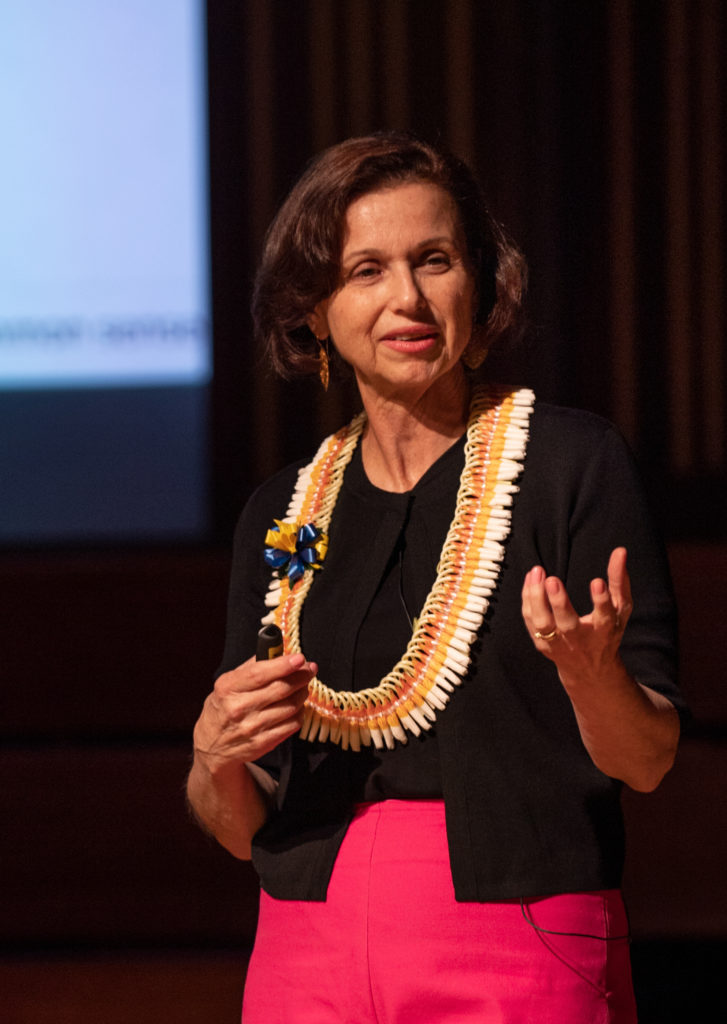Team Up! Presents Linda Burch of Common Sense Media
When it comes to media and technology, families are facing the challenges and potential of a world where nearly every child under 8 in the United States has access to a mobile device at home, babies learn to swipe and tap, and teenagers are more comfortable communicating online than face-to-face. Linda Burch – co-founder and chief education and strategy officer of Common Sense, the nation’s leading nonprofit organization dedicated to helping families thrive in today’s complicated digital world – recently spoke to Punahou parents about how to help their children and teenagers navigate this world.
As part of her work with Common Sense, Burch meets with educators, parents and students across the globe, sharing information and offering strategies to help kids utilize technology in safe, responsible and ethical ways. Her Feb. 11 presentation, “Parenting in the Digital Age,” kicked off Punahou’s new Team Up initiative, a parenting education program that includes speaker sessions, workshops and a podcast.
Listen to our inaugural Team Up podcast with Linda Burch and Punahou Junior School Principal Paris Priore-Kim ’76:
Punahou’s Team Up podcast is available on Apple Podcasts, Google Play, Spotify and Simplecast.

During her talk at Punahou, Burch spoke about how families can use media in balance, find quality content, set expectations around healthy use to prevent conflict, and raise media savvy consumers and creators. According to Common Sense’s 2019 report, “The Common Sense Census: Media Use by Tweens and Teens,” tweens now spend an average of five hours on their phone, while teens spend on average 7.5 hours. Kids now rely on their phones and tablets for much of their entertainment, which includes watching videos, playing games and participating in social media.
“When you think about what has happened over the course of the past 15 years, it’s really remarkable,” Burch said. “When we founded Common Sense in 2003, there was no Facebook, Twitter or TikTok. The iPod was a year old, and Google wasn’t yet a verb. Fast forward to today, and media and technology is affecting every part of our kids’ lives. They are on their devices and social media 24/7 and have access to information and people around the world.”
While this landscape has positive potential for creative expression, connections, and learning, there are also challenges, including being exposed to inappropriate content, digital distraction, cyberbullying and hate speech.
“It is a challenging world, but we’re all in it together,” Burch said. “I feel that media and technology could be so wonderful. But navigating this rapidly evolving digital landscape requires families to have control, understanding, and trust when it comes to the role tech plays in their lives. It’s about asking ourselves, as parents, as educators, and as kids: Is this technology making my life easier or distracting me from what’s really important?”
Burch offered parents some simple steps to help raise kids who think critically and use technology safely and responsibly:
- Embrace their world: Engage with your kids and encourage an open dialogue about what they’re seeing, playing, creating, and posting, as well as how they’re communicating. If your kids play video games, sit down and play with them to understand what it’s about and spark conversation and guide them as you would on a playground.
- Do your homework: Learn about the world your children are living in. Reference the Common Sense Parents’ Ultimate Guides, which can help keep you up-to-date and answer questions about all of the latest titles and trends including YouTube, Instagram, TikTok, Fortnite, Parental controls, and more. And check out Common Sense’s library of reviews to choose apps, games, movies, TV, shows, websites, and books that are age-appropriate for your kids.
- Stay current: Learn how devices have changed family routines and in-person relationships in The New Normal: Parents, Teens, Screens, and Sleep in the United States. And explore the latest research on why some kids are more deeply affected by—and connected to—their digital worlds in Social Media, Social Life report.
- Set limits: Make sure to get the conversation started in your home with Family Media and Device Agreement. Establish rules and boundaries with your family, regarding technology usage. Some common ones are device-free dinners or device-free car rides or to set time limits for digital usage and to have a time at night where everyone puts their devices in a central place to charge. Start doing this when your children are young.
- Protect privacy: Teach your children to protect their digital privacy and to respect the privacy of others. Remind them they’re creating a “digital footprint,” so they need to know the power of their words and actions.
- If you’re concerned about an app, download it and try it yourself. For instance, Yolo is an anonymous app in which kids can pose questions and give answers back, such as, ‘how do I look’ or ‘do you like me?’ Then it allows people to give their feedback anonymously — which can get pretty mean spirited. With TikTok, participants create and share lip synching videos, and comment on them but there are concerns about privacy, bullying and age-inappropriate content.
- Cyberbullying: If you discover your child is being exposed to hate speech or cyberbullying, either as a perpetrator or a recipient, the first step is to listen. Don’t get too alarmed, ban the cell phone, or call the school immediately. Once you know what happened, you can find advice from Common Sense here.
- Be a good role model: Remember, your kids are watching you. Parents need to disengage from their technology too and show kids how to be present.
“The challenge of this ever-evolving digital world is not going away. But I’m hopeful that working together, parents and educators can raise a generation of digital citizens and create a world we are proud for them to inherit,” Burch said.

